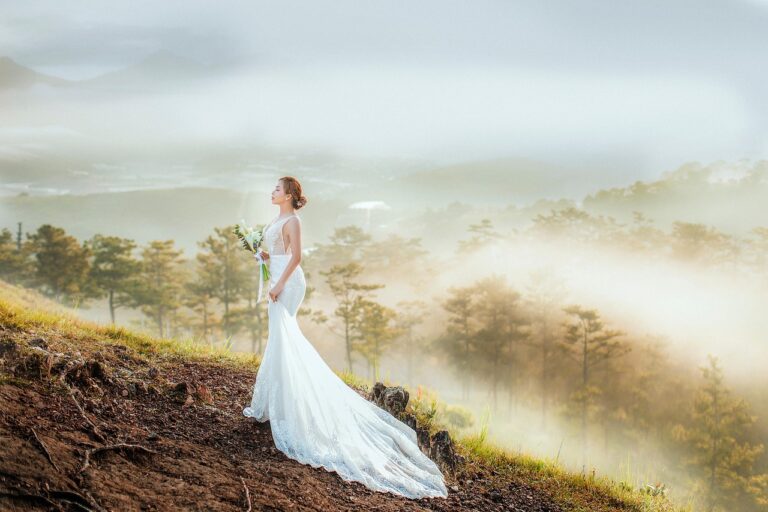The bridal industry in California has seen a dramatic shift in the last ten years, with sustainability now being a fundamental component of contemporary elegance rather than a fad. Designers from the Bay Area to Venice are reinventing bridal wear by fusing ethically conscious design with couture. These labels are spearheading a movement that embodies both individual values and the urgency of the environment, rather than just reacting to a trend.
Grace Loves Lace is distinguished by its steadfast dedication to environmentally responsible craftsmanship. Megan Ziems founded the company, which uses a made-to-order model with lace certified by the Global Recycled Standard in its Venice studio. They only cut what is required, turning extra fabric into new yarns, as opposed to mass-producing gowns that might never be worn. Brides wear their values in addition to their dress. Under the California sun, one bride from Los Angeles described how her dress felt “like poetry stitched into fabric,” elegant yet cozy.
| Designer / Brand | Location | Key Sustainability Feature | Price Range | Size Range |
|---|---|---|---|---|
| Grace Loves Lace | Venice, CA | Recycled eco lace, zero-waste production | From $1,600 | XS–3XL |
| Reformation | Los Angeles, CA | Climate-neutral, uses deadstock and organic materials | $298–$898 | 0–24 |
| Christy Dawn | Los Angeles, CA | Handmade with deadstock fabric, regenerative practices | $238–$3,000 | XS–XL |
| Wear Your Love | Northern California | Organic cotton, zero-waste, fully made-to-order | $1,620–$3,460 | Custom |
| KAMPERETT | San Francisco, CA | Small batch, natural fabrics, ethically run studio | $380–$1,200 | XS–XXL |
| Whimsy + Row | Los Angeles, CA | Locally produced, Tencel and Cupro, zero fabric waste | $218–$1,500 | XS–XL |
| Maison Sully | Los Angeles, CA | Vintage upcycling, custom tailoring, recycled accessories | $225–$1,000+ | 0–14 |
| Daughters of Simone | Fresno, CA | Ethically sourced materials, vintage-inspired lace | $1,000–$3,000 | 0–18 |
| Loulette Bride | Brooklyn / Online | Natural fabrics, recycled poly, tree planted per dress | $195–$3,000+ | 0–40 |
| Jenny Yoo | Stocked in CA salons | Certified ethical factories, recycled fabrics, community reuse | $198–$1,200+ | XS–XL |
Reformation, in contrast, uses transparency and data to approach sustainability. Reformation, which is renowned for its cutting-edge silhouettes and elegant tailoring, highlights its waste, water, and carbon reductions right on product pages. Their RefScale, which clearly breaks down each dress’s environmental cost, is especially inventive. In their Silver Lake boutique, stylists frequently discuss the environmental impact during fittings with the same fervor they use to discuss hemline changes.
Sustainability is more than just fabric deep at Christy Dawn. Their dresses are made with deadstock textiles and regenerative farming methods, drawing inspiration from the Topanga Canyon’s natural beauty. Each piece is ethereal in design but grounded in accountability. One bride from Santa Barbara remembered wearing her Dawn gown while strolling barefoot along the coast, knowing that the dress was made by fair-wage artisans in their workshop in Los Angeles.
Wear Your Love in Northern California is a prime example of what happens when dedication and comfort collide. Their gowns are made from certified organic cotton, which is incredibly soft and hypoallergenic, and were founded by Jillian Leigh. Their zero-waste production model is especially advantageous. Every dress is custom-made, and any leftover materials are recycled into industrial textiles. A bride from San Jose described how she felt totally herself in a dress that flowed with her rather than against her as she danced freely into the night, “not once tugging or adjusting.”
KAMPERETT in San Francisco provides minimalist brides with a subtly opulent option. They tend to use simple lines, subdued colors, and sophisticated textures. Their business strategy is incredibly effective and deeply considerate, with each gown being handcrafted in small batches using materials sourced sustainably. Wearing a KAMPERETT gown was described by one bride as “like wrapping yourself in integrity.”
Sustainable bridalwear is given a youthful boost by the LA studio of Whimsy + Row. Their gowns are manufactured within a few miles of their headquarters using biodegradable materials like Cupro and Tencel. To ensure that nothing is wasted, leftover fabrics are turned into headbands, hats, and crunchies. Their method of converting waste into wearable beauty is incredibly successful in lowering the amount of textiles that end up in landfills.
Los Angeles-based Maison Sully is bringing secondhand vintage items back to life with remarkable style. Brides can create contemporary masterpieces out of 1960s and 1970s gowns by carefully hand-tailoring them. Their method, which combines personal narrative with fashion history, is especially inventive. One bride recently referred to her Maison Sully gown as “wearing heritage,” a unique item with a personality all its own.
Daughters of Simone in Fresno combines ethical sourcing with nostalgia. They minimize the use of synthetic materials while paying homage to 1970s Americana through the use of French lace and scalloped crochet. They intentionally design their gowns, emphasizing customization and longevity. Their collections provide a highly adaptable style for brides who are drawn to bohemian silhouettes, making them ideal for vineyard elopements or mountaintop vows.
Despite having its physical headquarters in Brooklyn, Loulette Bride has become popular among Californian brides due to its genuine sustainability and ease of use online. Each dress is made to order with organic cotton and hemp and comes with a donation for a tree planting, symbolizing the connection between environmental restoration and marriage. Although the act might not seem like much, it gradually grows into a forest of love and rebirth.
Jenny Yoo completes the list with a hybrid strategy that blends classic design with contemporary morals. Her dresses are available in boutiques across California, despite having their headquarters in New York. Jenny Yoo’s collections demonstrate the brand’s significantly increased commitment to ethical fashion by utilizing recycled yarns and upholding its Workplace Conditions Assessment certification.
A broader story emerges through these ten designers, one in which bridal gowns are made to be a statement of principle as well as taste. Public personalities are also reflecting this change. The well-known environmental activist actress Shailene Woodley once said that her wedding gown would “honor the earth as much as the ceremony.” Thousands of brides throughout California share this viewpoint, which points to a broader cultural reexamination of what beauty on a wedding day means.

